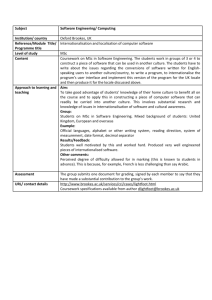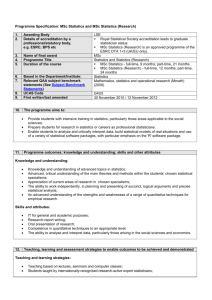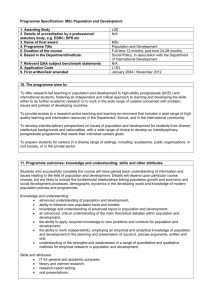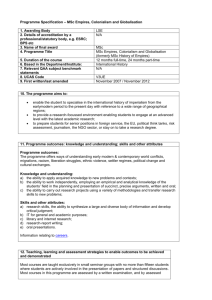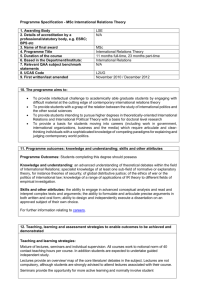School of Agriculture, Policy and Development
advertisement
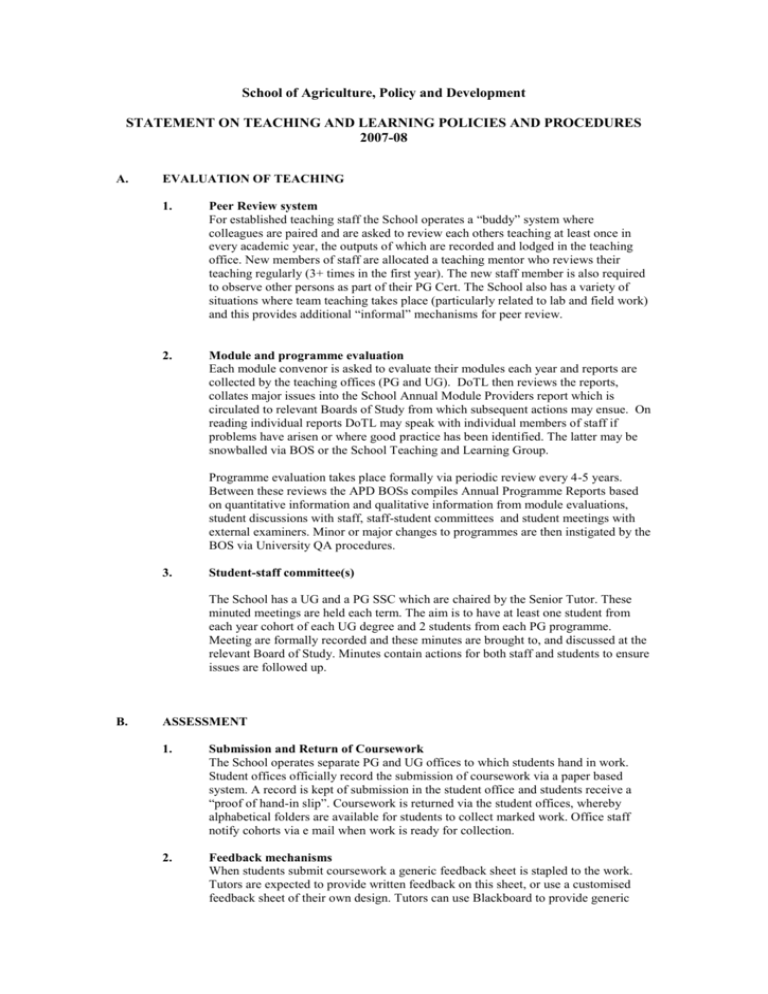
School of Agriculture, Policy and Development STATEMENT ON TEACHING AND LEARNING POLICIES AND PROCEDURES 2007-08 A. EVALUATION OF TEACHING 1. Peer Review system For established teaching staff the School operates a “buddy” system where colleagues are paired and are asked to review each others teaching at least once in every academic year, the outputs of which are recorded and lodged in the teaching office. New members of staff are allocated a teaching mentor who reviews their teaching regularly (3+ times in the first year). The new staff member is also required to observe other persons as part of their PG Cert. The School also has a variety of situations where team teaching takes place (particularly related to lab and field work) and this provides additional “informal” mechanisms for peer review. 2. Module and programme evaluation Each module convenor is asked to evaluate their modules each year and reports are collected by the teaching offices (PG and UG). DoTL then reviews the reports, collates major issues into the School Annual Module Providers report which is circulated to relevant Boards of Study from which subsequent actions may ensue. On reading individual reports DoTL may speak with individual members of staff if problems have arisen or where good practice has been identified. The latter may be snowballed via BOS or the School Teaching and Learning Group. Programme evaluation takes place formally via periodic review every 4-5 years. Between these reviews the APD BOSs compiles Annual Programme Reports based on quantitative information and qualitative information from module evaluations, student discussions with staff, staff-student committees and student meetings with external examiners. Minor or major changes to programmes are then instigated by the BOS via University QA procedures. 3. Student-staff committee(s) The School has a UG and a PG SSC which are chaired by the Senior Tutor. These minuted meetings are held each term. The aim is to have at least one student from each year cohort of each UG degree and 2 students from each PG programme. Meeting are formally recorded and these minutes are brought to, and discussed at the relevant Board of Study. Minutes contain actions for both staff and students to ensure issues are followed up. B. ASSESSMENT 1. Submission and Return of Coursework The School operates separate PG and UG offices to which students hand in work. Student offices officially record the submission of coursework via a paper based system. A record is kept of submission in the student office and students receive a “proof of hand-in slip”. Coursework is returned via the student offices, whereby alphabetical folders are available for students to collect marked work. Office staff notify cohorts via e mail when work is ready for collection. 2. Feedback mechanisms When students submit coursework a generic feedback sheet is stapled to the work. Tutors are expected to provide written feedback on this sheet, or use a customised feedback sheet of their own design. Tutors can use Blackboard to provide generic class-wide feedback in addition to individual feedback and where appropriate verbal feedback is provided to both individuals are cohorts. C. 3. Mechanisms for moderation of marks All exam marks are moderated using a sampling strategy as determined by the examinations officer. Major pieces of coursework, particularly in modules that are 100% coursework assessed to be moderated, based on a sampling strategy as determined by the examination officer, in line with University recommendations. 4. Policy on anonymous marking Examinations are marked anonymously using the university-wide exam system. PROGRAMME MANAGEMENT 1. Boards of Studies (Please complete the table below for each Board of Studies) Board of Studies Chair Programmes Memberships Number and timing of meetings per year Board of Studies Chair Programmes Memberships Number and timing of meetings per year Undergraduate BOS Mike Bryant/ Richard Tiffin (alternates) Animal Science, Agriculture, Agricultural Business Management, Rural Resource Management, Rural Environmental Sciences, Consumer Behaviour and Marketing, Food Marketing and Business Economics All programme directors, 2 students, 2 external members, SDTL, HOS Meets 3x per year Postgraduate BOS Chris Garforth MSc Agricultural Development Economics, MSc Agricultural Economics, MSc Applied Development Studies, MSc Communication for Innovation and Development, MSc Development Finance, MSc Development Policy, Practice and Process, MSc Environment and Development, MSc Food Economics and Marketing, MSc Research Agricultural and Food Economics, MA Social Development and Sustainable Livelihoods, MSc Tropical Agricultural Development All programme directors, 2 students, 2 external members, SDTL Meets 3x per year 2. Other Teaching and Learning Committees The SDTL convenes a teaching and learning foresight group which meets twice a year to consider up and coming teaching and learning issues, to identify good practice and mechanisms for the dissemination thereof. This group makes recommendations to the relevant BOS. Each of the intra-school departments holds 3 staff meetings per year and these provide a fora for discussing both UG and PG issues. Heads of Department convene ad hoc teaching meetings as necessary. Issues are fed into the BOS. 3. External Examiners External examiners normally serve for 3 years and are appointed in line with University procedures. Externals are provided with full details of programmes and sent copies of exam papers for their scrutiny. Externals are expected to attend examiners meetings at the end of the exams period and are expected to view and moderate examination scripts, research dissertations and coursework portfolios provided by students. They are also expected to meet and discuss the programme with the finalist cohort. The School (via SDTL) responds formally to external examiners comments and actions are sanctioned by the respective BOS. 4. D. E. Professional Accreditation None PERSONAL TUTORING, STUDENT SUPPORT AND DISCIPLINE 1. Implementation of Personal Development Planning The School runs a tutor system which is used in conjunction with the Universitywide personal academic record (PAR) system to provide PDP. The minimum expectation is that tutees make a PAR meeting appointment at least once per term with their tutors. The appointment and content thereof is recorded. Tutees are also encouraged to see their tutor at the start and end of each term. The School is also very proactive in relation to career management skills and expects students to undertake formal career planning sessions in both parts 1 and 2. 2. Neglect of work The School operates a general discipline policy in line with University proceduares, which includes neglect of work. This comprises of a stage 1 verbal warning and a meeting with the respective PD, a stage 2 formal letter on student record and meeting with SDTL and stage 3 formal letter and referral to the FDTL who may then take the issue to the UBTL. The School records attendance at lectures in year 1 as a mechanism for identifying students who are struggling, on the basis that nonattendance is strongly correlated to drop-out rates. Students who are poor attendees first see their programme director (PD), and then if the problem persists, are asked to see the SDTL. TEACHING AND LEARNING QME ROLES (Please complete the table below giving the names and email addresses of staff who fulfill each of these roles) School Director of T&L UG Admissions Tutor(s) Taught PG Admissions Tutor(s) Senior Tutor Examinations Officer Learning Technology Co-ordinator Disability representative CMS Co-ordinator Director of Graduate Institute Julian Park One for each programme, (6 programmes) One for each programme, (9 programmes) Nick Beard Mike Bryant Kim Mernagh Nick Beard Nick Beard/ Alistair Murdoch Chris Garforth

